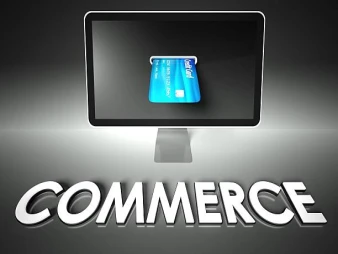Free support 24/7
Free support 24/7

In today's rapidly evolving era of technology, new concepts have emerged that bring with them innovative opportunities for modern applications. One of these popular concepts is the "Blockchain" technology, which has proven its importance in various fields, including e-commerce. This article will explain the concept of blockchain and how it can be used to improve e-commerce operations and make them more secure and transparent.
Understand the concept of Blockchain
Blockchain technology began as an idea in 2008 when an anonymous person known as the operator by the name of "Satoshi Nakamoto" published a paper titled "Bitcoin: A Peer-to-Peer Electronic Cash System". The idea of the paper was to create an electronic payment system based on a digital currency called "Bitcoin", which relies on blockchain technology as the basis for its operation.
A blockchain is a type of decentralized and encrypted record, where a copy of the complete record is shared among many participants. Data in a blockchain is organized in the form of "blocks", with each new block being generated based on the previous block, forming a tamper-proof chain of blocks. This chain is a shared record that holds accurate and secure details that are permanently recorded.
Blockchain uses in e-commerce
1. Verify the origin and quality of the products
The problem of verifying the origin and quality of products is one of the challenges facing e-commerce. Through blockchain technology, specific information about the origin of the product and the stages of its manufacture and shipment can be recorded in a decentralized registry. This can help increase transparency and thus increase trust between buyers and sellers.
2. Simplify payment processes
Traditional payment processes rely on well-known financial intermediaries, which can increase costs and take time. Using blockchain technology, a decentralized payment system can be created that allows buyers to carry out transactions directly without an intermediary. This reduces delays and costs associated with financial operations.
3. Ensure data security and protection
Security and data protection are crucial in the field of e-commerce. Blockchain technology offers a secure way to store and share data, as data is encrypted and distributed across the network. This makes it very difficult to tamper with or hack records.
4. Supply Chain Management
Supply chain management is vital in e-commerce to ensure effective and accurate delivery of products. Blockchain technology improves supply chain transparency by recording every stage of production and shipment on the blockchain. This can reduce errors and increase process flow efficiency.
5. Providing smart contracts
Smart contracts are software that allows transactions to be executed automatically when certain conditions are met. These contracts are based on blockchain technology and can be applied in e-commerce to simplify and speed up transactions and reduce the need for intermediaries and paper records.
6. Achieving a commitment to intellectual property rights
Blockchain technology can contribute to protecting intellectual property rights by registering businesses and innovations on the blockchain. This can contribute to reducing counterfeiting and digital piracy.
7. Improve user experience and customer service
Blockchain technology can improve user experience and customer service in e-commerce. By recording customer information and purchase details on the blockchain, sellers can provide a better personalized experience for customers and provide customized service based on analytics and data.
8. Anti-counterfeiting and cheating
Counterfeiting and cheating are two problems that greatly affect e-commerce. With the use of blockchain technology, transactions and transactions can be recorded in a way that cannot be tampered with or modified. This helps reduce counterfeiting and fraud and achieve a higher level of integrity and transparency in the electronic market.
9. Supporting global trade
Blockchain technology facilitates global trade by providing a safe and transparent environment for the exchange of goods and services between different countries. The transparency and security provided by the blockchain contributes to building trust between stakeholders and stimulating international trade.
10. Facilitate verification of identity and permits
In an electronic commerce environment, there may be a need to verify the identity of individuals or entities and their authority to carry out certain transactions. Blockchain technology can provide a secure and efficient way to store and share essential identity and authorization information.
Challenges of using technology in e-commerce using Blockchain
Despite the great benefits that blockchain technology offers to e-commerce, it also faces challenges that warrant consideration. Here are some of those challenges:
1. Legal and regulatory issues
Blockchain technology poses legal and regulatory challenges related to the concept of responsibility and the technologies used. An appropriate legal and regulatory framework must be put in place to ensure that blockchain is implemented in a manner that is consistent with existing laws and that the rights of all parties involved are protected.
2. Compatibility with existing systems
Developing a blockchain architecture and integrating it with existing systems and architectures in e-commerce organizations can be a challenge. Blockchain technology must be compatible with existing systems and facilitate seamless integration.
3. Security and privacy issues
Despite the security provided by the blockchain, e-commerce may face security and privacy challenges related to protecting sensitive data and preventing cyber attacks. Strict security measures must be taken and encryption techniques used to protect information.
4. Adoption of technology and education
There may be challenges in adopting blockchain technology by all parties involved in e-commerce operations. It takes awareness and education to understand the benefits of blockchain and how to use it effectively.
5. Implementation and operating costs
Blockchain technology involves development costs
infrastructure implementation and operation. These costs must be considered and ensured that they are in line with the organizations and companies' budgets.
Continue to develop and innovate
Despite the challenges and risks related to the use of blockchain technology in e-commerce, it is important to stress the importance of continuing development and innovation in this field. The commercial and technical community can form specialized work teams to study and analyze the impact of blockchain technology on e-commerce operations and effectively address the challenges.
Development of standards and regulations
Blockchain technology needs an appropriate legal and regulatory framework to ensure its proper and effective implementation. Governments and regulators must establish standards and regulations that guide the use of blockchain technology in e-commerce and protect the rights of all parties.
Education and awareness
Awareness and education about blockchain technology is essential. Universities, educational institutions, and technical organizations should provide courses and educational materials that explain blockchain concepts and their potential uses in e-commerce.
research and development
Research and development in the field of blockchain technology and its applications in e-commerce should be supported. This includes developing innovative tools and software to facilitate the use of blockchain, and exploring new ways to deal with technical and legal challenges.
Collaboration and partnerships
It is important to enhance cooperation between different companies and institutions to exchange experiences and knowledge on the use of blockchain technology in e-commerce. Partnerships can enhance development and simplify adoption.
Blockchain technology in the future of e-commerce
With the rapid development of blockchain technology, we can expect many future changes and improvements in the field of e-commerce:
1. Facilitating international transactions
Blockchain technology will play a major role in facilitating and accelerating international transactions. It will allow the removal of intermediaries and bureaucratic hurdles, thereby improving the cross-border trading experience.
2. An innovative payment system
Blockchain technology will enable the development of innovative payment systems that reduce delays and transaction costs. Online payment will become more secure and transparent, which will enhance trust between customers and sellers.
3. Redefining the supply chain
Blockchain technology will transform supply chain management, as products can be accurately traced from start to finish. Transparency, quality and flow speed of products will be improved.
4. Security verification and intellectual property protection
Blockchain technology is expected to have a significant impact in the field of intellectual property protection and security verification. Individuals and companies will be able to securely and reliably register their businesses and innovations.
5. Improve user experience
Blockchain technology will improve the user experience in online stores. It will provide accurate and transparent information about products and offers, facilitating the decision-making process for buyers.
6. Smart contracts and automated negotiation
With the development of smart contracts, parties can automatically execute deals based on specific conditions without the need for human intervention. Negotiation processes and deal execution will be facilitated more effectively.
7. Enhancing transparency and combating fraud
The use of blockchain technology will contribute to enhancing transparency and transparency in e-commerce. Data and information will be available to everyone in a secure and reliable manner, which reduces the chances of fraud and forgery.
Social and economic challenges associated with blockchain technology
With the development of the use of blockchain technology in the field of e-commerce, social and economic challenges will emerge that must be taken into account and addressed:
1. Balancing Transparency and Privacy:
Blockchain technology enhances the transparency of transactions and data, but at the same time, the privacy rights of individuals and companies must be considered. Mechanisms must be developed to enable the requirements of transparency and protection of personal data to be met.
2. Shifts in the labor market:
Blockchain technology may lead to shifts in the labor market, as new skills may be required to understand and manage the technology. It is important to provide training and education to workers and professionals to prepare them for these future transformations.
3. Legal and Regulatory Matters:
With the versatility of blockchain technology, new legal and regulatory challenges may arise. A legal framework should be developed that defines the responsibilities, rights, and duties related to blockchain in the commercial sphere.
4. The exacerbation of the digital divide:
Despite the great benefits of blockchain technology, access to this technology may be limited in some areas or for certain groups of the population. Efforts must be made to promote digital interdependence and reduce the digital divide.
5. Environmental Challenges:
Since blockchain technology may consume a lot of energy, environmental problems such as increased electricity consumption and pollution may arise. Technological and economic solutions must be developed that achieve a balance between environmental sustainability and the use of blockchain technology.
6. User Experience and Simplification:
Despite the potential benefits, blockchain technology can get complex for everyday users. It is important to develop easy-to-use user interfaces and streamline operations to encourage wide adoption.
Future vision
Blockchain technology is an essential part of the future of e-commerce, as it will contribute to changing how value is exchanged and transactions are executed online. By focusing on innovation and sustainable development, blockchain can be an indispensable part of the future economic and social system.
At the end of the journey towards the future of e-commerce with blockchain technology
Blockchain technology represents a paradigm shift in the world of e-commerce, promising greater transparency, better security, and higher efficiency. Employing this technology in the field of e-commerce requires widespread cooperation between companies, governments, technical institutions and civil society. If exceeded the challenge
The future challenges facing blockchain technology require strategic thinking and continued development and innovation.
As Blockchain technology is a turning point in the history of e-commerce, we must learn from past experiences and adopt a sustainable approach to make the best use of this technology and overcome complex challenges. Through collaboration and creative thinking, we can achieve an advanced and reliable e-commerce experience that meets the needs and aspirations of modern society.
in the end
The use of blockchain technology in e-commerce represents an opportunity to bring about a real shift in how we view buying, selling and exchanging online. By working together, adhering to standards, and looking to the future with optimism, blockchain technology can be a tributary of progress and prosperity in the world of e-commerce and building a prosperous future for all.

تعلم كيف تقرأ لغة الأرقام لتتوقف عن التخمين وتبدأ في اتخاذ قرارات مبنية على بيانات تضاعف أرباحك وتوفر ميزانيتك التسويقية الضائعة

نكشف لك كيف تغير عقلية العميل من الرغبة في استعادة المال إلى الرغبة في استبدال المنتج
You can create your store easily